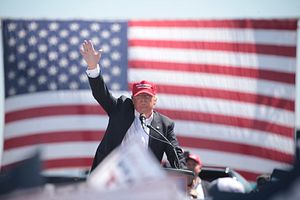During this year’s U.S. presidential campaign, both candidates have been full of fiery rhetoric, from Republican candidate Donald Trump saying his opponent, Hillary Clinton, “has to go to jail” to Clinton accusing Trump of “talking down our democracy.” This sort of bombast has received the lion’s share of media attention in America, with Trump’s policy pronunciations receiving less attention than many foreign observers realize. This is particularly true in relation to East Asia policy, where Trump’s thought bubbles about withdrawing U.S. troops from Japan and South Korea and openness to their acquisition of nuclear weapons have received scant media attention compared to his other remarks.
It’s tempting to conclude that Trump’s musings won’t impact U.S. policy, as pundits believe he is unlikely to be elected. However, the truth is that his comments have already influenced Japanese and South Korean political discourse in a manner that may have a lasting impact on U.S. policy toward the region.
As the Los Angeles Times noted in July, Japan’s “die-hard conservatives who want to see Japan ditch its pacifist constitution and re-arm itself have called the presumptive Republican nominee a once-in-a-lifetime opportunity to cut Japan’s apron strings with Washington and make Japan an independent country.” This isn’t a mainstream opinion amongst Japanese conservatives; on the contrary, many have expressed disdain toward Trump and have no desire to attain nuclear weapons. But is Trump’s rhetoric lending credibility to Japan’s far right, which could force mainstream conservatives to embrace their position? This is a concerning proposition, as Japan’s neighbors harbor grievances over their shared history and are fearful of the prospect of a militaristic Japan re-emerging.
Meanwhile, in South Korea, National Assembly members from both major parties recently called for developing nuclear weapons, including the current and former chairmen of the ruling Saenuri Party. Some politicians have held this position in the past but, as the New York Times noted in February, it was “contained to a small band of conservative politicians and pundits.” As Trump ratcheted up his rhetoric over the past few months, support for this position seems to have extended well beyond a small band of individuals and entered South Korea’s mainstream political consciousness.
To be fair, these positions in Japan and South Korea haven’t emerged solely due to Trump’s rhetoric; Chinese aggression in the South China Sea and North Korean nuclear tests have certainly contributed to their emergence. But similar events in the past have not led to positions of this nature perforating the political mainstream. During past North Korean nuclear tests, for example, reactions were more subdued, partially due to confidence in the assumption that the United States would meet its security obligations in a crisis situation. Trump’s rhetoric has caused political actors in Japan and South Korea to question that assumption, undermining U.S. credibility at a time where it needs to be reinforced.
The mere questioning – let alone the deterioration of – this assumption could very well have long-term consequences for U.S. policy in the region. For instance, nuclear aspirations in either Japan or South Korea raise the prospect of a regional arms race that could quickly spiral out of control due to a lack of trust between countries in the region. Even if an arms race doesn’t materialize, implementation of these proposals would destabilize a region that accounted for 29 percent of global GDP in 2015 and negatively impact the global economy. U.S. security guarantees are crucial to stability, and calling them into question could start the region down a road of destabilization that will impact the United States for years to come.
The good news is that this problem is fixable. Upon election, the next administration should quickly restore confidence in its treaty obligations and credibly assure Japan and South Korea that America will uphold them. Furthermore, Republican members of Congress should showcase their commitment to those obligations and demonstrate that Trump’s pronunciations are not representative of mainstream Republican opinion. Reassurances offered by three Republican Senators during a July trip to Seoul offer a good example for their colleagues to follow. The die isn’t cast, but if nothing is done to address this problem it will cause consternation for policymakers on both sides of the Pacific.
Parker Novak is the Principal of Red Team Advisory Group, a Washington, DC-based political consulting firm, and studying for a Master’s degree in Global Advocacy at George Washington University. He earned a Bachelor’s degree in Political Science from The Ohio State University.

































